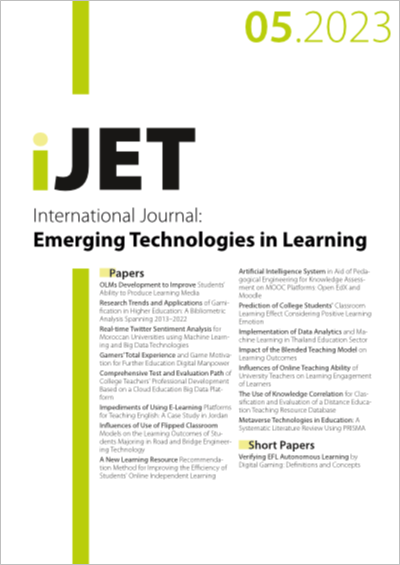Influences of Use of Flipped Classroom Models on the Learning Outcomes of Students Majoring in Road and Bridge Engineering Technology
DOI:
https://doi.org/10.3991/ijet.v18i05.37813Keywords:
Use of flipped classroom technology, Road and Bridge Engineering Technology, Learning outcome, Teaching experiment, Independent sample T test, Paired sample T testAbstract
Abstract—The new “Internet+” teaching mode during the COVID-19 pandemic has guaranteed the smooth learning progress of university students in China. High-efficiency reconstruction of time and space for knowledge teaching and internalization based on informationalized teaching mean is an important approach to online learning. A flipped classroom is a teaching mode that is formed through bottom-up exploration. Combined with teaching practical situations, the flipped classroom realizes the transformation from the teacher-centered mode to the student-oriented mode successfully and has important value to the teaching of professional core courses, which are difficult to be learned. In this study, 80 freshmen majoring in Road and Bridge Engineering Technology at Yellow River Conservancy Technical Institute in Henan Province of China were selected as research objects, and Road Survey Design and Lofting was chosen as the teaching course. Under these circumstances, a teaching experiment comparison was designed. The experimental group used flipped classroom technology based on Attention, Relevance, Confidence, and Satisfaction (ARCS) motivation model theory, while the control group used the traditional teaching mode. Research results demonstrate that before the experiment, the learning outcomes of two groups in Road Survey Design and Lofting were basically consistent (P=0.908>0.05) without obvious differences. After finishing the experiment, the post-test results of the control group have not improved significantly compared with the pre-test results (P=0.0938>0.05). However, the post-test results of the experimental group have improved significantly compared with the pre-test results (P < 0.001). The average scores of the experimental group are far higher than that of the control group, thus indicating the evident progress of the experimental group. Noticeable differences in the post-test results between the experimental group and the control group are observed (P < 0.001). The research results are of great significance to enriching the teaching mode of core application courses for engineering majors in university, as they provide evidence that the flipped classroom increases the learning interests and motivation of students and demonstrate the teaching effect of flipped classroom technology in universities.
Downloads
Published
How to Cite
Issue
Section
License
Copyright (c) 2023 Juanling Wang, Mengshi Wang

This work is licensed under a Creative Commons Attribution 4.0 International License.



